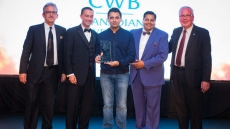Crime is a major problem in Surrey especially in the new transitioning downtown core of Surrey City Centre.
The city is growing so rapidly that crime is becoming a complex social problem that needs a multiple layer approach.
The city can benefit from more police, more patrol, and more prevention as the cornerstones of this three-pillar approach.
The “no call is too small” philosophy needs to be put into practice as it is in Delta.
Safer streets are the foundation to build a stronger community.
15-POINT PLAN
Below is a common sense 15-point plan to fight crime in the city:
1. Hire new Surrey RCMP police officers to keep pace with population growth and the needs of the city.
2. The Surrey RCMP force needs to be diverse and representative of the community it serves to build trust and integrity with the population.
3. Surrey needs to compare the number of police officers per capita with other comparable cities in Canada and around the world. An analysis of cities that have low crime rates needs to be completed and similar strategies can be applied in Surrey.

4. Create a 2500-person strong community police force to patrol the streets. This would be a volunteer reserve force. Surrey RCMP police officers and city bylaw officers could be recruited from this reserve force as a priority. These volunteers would also gain valuable experience to work in corrections, border security, and the Canadian forces.
5. Enhance the victim assistance program where criminals convicted of serious crimes would be forced to pay 15% of their gross income for up to 15 years after release to the victim assistance fund.
6. Install cameras and better street lighting in all high crime areas of the city.
7. Establish a community court at the old City Hall in Newton to rehabilitate minor offenders, especially youth, to give them a second chance at life.
8. Liaise with various stakeholders including higher levels of government to reduce social problems linked to crime such as poverty, homelessness, drug and alcohol addiction, and mental illness. Develop a strategic plan to eliminate, reduce, or prevent crime before it even happens. The city can expand the social planning department significantly with more social workers and researchers to develop the social and economic case for higher levels of government to provide financial resources to resolve Surrey’s growing social problems.
9. Develop and fund recreational, leisure, and sporting programs for residents in the community, especially youth, to participate in to deter them from a life of crime including gangs.

10. Increase funding to the Surrey Crime Prevention Society and the Block Watch program to keep pace with population growth and to meet the needs of the city.
11. Enhance services and supports to victims of domestic violence so they have real choices and safe options and are not forced to live in dangerous, fearful situations.
12. Keep Surrey clean and well-maintained to reduce graffiti and vandalism so that residents take pride in their city.
13. Have the Surrey School District hire more security and police liaisons for all schools to ensure kids are safe and not at-risk of criminal activity such as getting involved in gangs, and drugs.
14. Have the Surrey School District develop a peer support mentorship program in schools to guide youth in a healthy positive direction with their future.
15. Have the Surrey School District develop courses and workshops on anti-bullying, racism, and other forms of discrimination, as well as educate the students on how to stay safe.
CONCLUSION
There you go! This is a common sense 15-point plan to fight crime in Surrey. Feel free to provide your feedback.
Last, specific cultural and ethnic communities may need a custom-tailored response to address crime within their communities. This includes the South Asian community where the families and community at-large needs to play a bigger role in terms of addressing male privilege and entitlement and how it impacts the paths our youth find themselves on and their social outcomes.

AUTHOR BIO
Alex Sangha is an award-winning author and social worker based in Surrey, B.C. He has an MSc in Public Administration and Public Policy from the Department of Government at the London School of Economics, as well as a Master of Social Work from Dalhousie University and a Bachelor of Social Work from UBC with a First Class Standing. Alex has lived in Surrey for over 20 years




